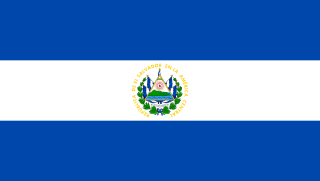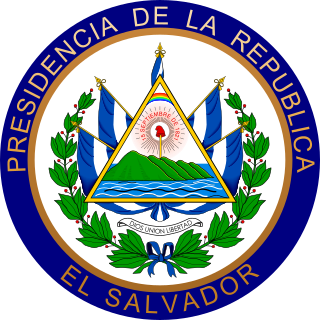| |||||
| Decades: | |||||
|---|---|---|---|---|---|
| See also: | |||||
Events of 2019 in El Salvador.
| |||||
| Decades: | |||||
|---|---|---|---|---|---|
| See also: | |||||
Events of 2019 in El Salvador.

Central America is a subregion of the Americas. Its boundaries are defined as bordering Mexico to the north, Colombia to the south, the Caribbean Sea to the east, and the Pacific Ocean to the west. Central America usually consists of seven countries: Belize, Costa Rica, El Salvador, Guatemala, Honduras, Nicaragua, and Panama. Within Central America is the Mesoamerican biodiversity hotspot, which extends from northern Guatemala to central Panama. Due to the presence of several active geologic faults and the Central America Volcanic Arc, there is a high amount of seismic activity in the region, such as volcanic eruptions and earthquakes which has resulted in death, injury, and property damage.

El Salvador, officially the Republic of El Salvador, is a country in Central America. It is bordered on the northeast by Honduras, on the northwest by Guatemala, and on the south by the Pacific Ocean. El Salvador's capital and largest city is San Salvador. The country's population in 2023 was estimated to be 6.5 million.

Politics of El Salvador takes place in a framework of a presidential representative democratic republic, whereby the President of El Salvador is both head of state and head of government, and of an executive power is exercised by the government. Legislative power is vested in both the government and the Legislative Assembly. The Judiciary is independent of the executive and the legislature. The Economist Intelligence Unit rated El Salvador a "hybrid regime" in 2022.

The history of El Salvador begins with several Mesoamerican nations, especially the Cuzcatlecs, as well as the Lenca and Maya. In the early 16th century, the Spanish Empire conquered the territory, incorporating it into the Viceroyalty of New Spain ruled from Mexico City. In 1821, El Salvador achieved independence from Spain as part of the First Mexican Empire, only to further secede as part of the Federal Republic of Central America two years later. Upon the republic's isolation in 1841, El Salvador became sovereign until forming a short-lived union with Honduras and Nicaragua called the Greater Republic of Central America, which lasted from 1895 to 1898.
The Football War, also known as the Hundred Hours' War or 100 Hour War, was a brief military conflict fought between El Salvador and Honduras in 1969. Existing tensions between the two countries coincided with rioting during a 1970 FIFA World Cup qualifier. The war began on 14 July 1969 when the Salvadoran military launched an attack against Honduras. The Organization of American States (OAS) negotiated a cease-fire on the night of 18 July, which took full effect on 20 July. Salvadoran troops were withdrawn in early August.

The Farabundo Martí National Liberation Front is a left-wing political party in El Salvador.

The president of El Salvador, officially titled President of the Republic of El Salvador, is the head of state and head of government of El Salvador. He is also, by constitutional law, the commander-in-chief of the Armed Forces of El Salvador. The office was created in the Constitution of 1841. From 1821 until 1841, the head of state of El Salvador was styled simply as Head of State.

The Nationalist Republican Alliance is a conservative, right-wing political party of El Salvador. It was founded on 30 September 1981 by retired Salvadoran Army Major Roberto D'Aubuisson. It defines itself as a political institution constituted to defend the democratic, republican, and representative system of government, the social market economy system and nationalism.

Juan Nepomuceno Fernández Lindo y Zelaya was a Conservative Central American politician, provisional president of the Republic of El Salvador from 1841 to 1842 and of the Republic of Honduras from 1847 to 1852.

General Carlos Humberto Romero Mena was a Salvadoran army general politician who served as President of El Salvador from 1 July 1977, until his overthrow in a coup d'état on 15 October 1979.

The municipalities or municipios of El Salvador correspond to the second level administrative division in the Republic of El Salvador which divide its departments. El Salvador contains 262 municipalities.

Carlos Mauricio Funes Cartagena is a Salvadoran politician and former journalist who served as President of El Salvador from 2009 to 2014. Funes won the 2009 presidential election as the candidate of the left-wing Farabundo Martí National Liberation Front (FMLN) party and took office on 1 June 2009.

Salvador Sánchez Cerén is a Salvadoran politician who served as the 42nd President of El Salvador between 1 June 2014 and 1 June 2019. He took office on 1 June 2014, after winning the 2014 presidential election as the candidate of the left-wing Farabundo Martí National Liberation Front (FMLN). He previously served as Vice President under President Mauricio Funes from 2009 to 2014. He was also a guerrilla leader in the Civil War and is the first and only ex-rebel to serve as president.

The Salvadoran military dictatorship was the period of time in Salvadoran history where the Salvadoran Armed Forces governed the country for almost 48 years from 2 December 1931 until 15 October 1979. The authoritarian military dictatorship limited political rights throughout the country and maintained its governance through rigged and fixed elections.
The following lists events that happened in 2014 in El Salvador.

Nayib Armando Bukele Ortez is a Salvadoran politician and businessman who is the 43rd president of El Salvador, serving since 1 June 2019. He is the first president since José Napoleón Duarte (1984–1989) not to have been elected as the candidate of one of the country's two major political parties: the left-wing Farabundo Martí National Liberation Front (FMLN) and the right-wing Nationalist Republican Alliance (ARENA).

Presidential elections were held in El Salvador on 3 February 2019, with Salvadorans electing the president and vice president for a five-year term from 2019 to 2024.

Nuevas Ideas is a Salvadoran political party. The party was founded on 25 October 2017 by Nayib Bukele, the then-mayor of San Salvador, and was registered by the Supreme Electoral Court (TSE) on 21 August 2018. The party's current president is Xavier Zablah Bukele, a cousin of Bukele who has served since March 2020.

The COVID-19 pandemic in El Salvador was a part of the worldwide pandemic of coronavirus disease 2019 caused by severe acute respiratory syndrome coronavirus 2. The virus was confirmed to have reached El Salvador on 18 March 2020. As of 19 September 2021, El Salvador reported 102,024 cases, 3,114 deaths, and 84,981 recoveries. As of that date El Salvador had arrested a total of 2,424 people for violating quarantine orders, and 1,268,090 people had been tested for the virus. On 31 March 2020, the first COVID-19 death in El Salvador was confirmed.
The cabinet of Nayib Bukele formed on 1 June 2019 to serve as President Nayib Bukele's cabinet from 1 June 2019 until 1 June 2024.